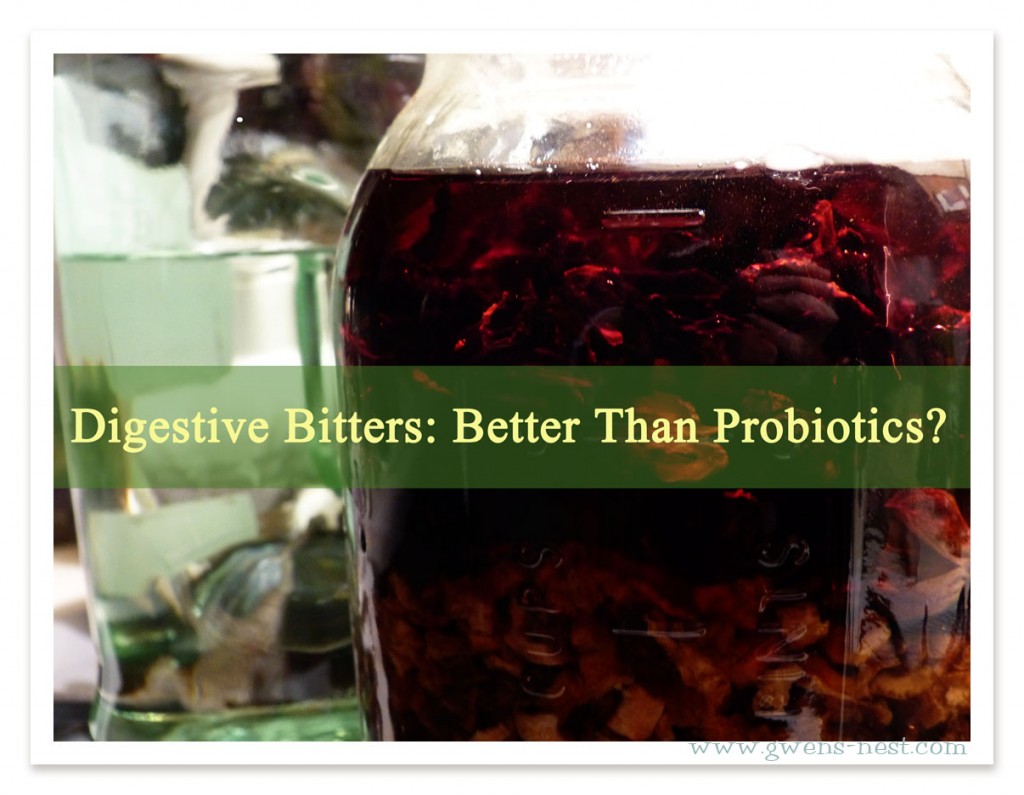 Digestive bitters were on the top of my “mad scientist” list this year…I had SUCH fun tinkering in the kitchen with my bitter herbs! If you’re wondering why I would even be interested in using things that taste nasty and bitter, I’ve got some COOL stories and info for you.Got tummy issues? Potty issues? Rumbly or uncomfortable digestion? Eczema and food sensitivities? This post is for you…you need to know about digestive bitters!
Digestive bitters were on the top of my “mad scientist” list this year…I had SUCH fun tinkering in the kitchen with my bitter herbs! If you’re wondering why I would even be interested in using things that taste nasty and bitter, I’ve got some COOL stories and info for you.Got tummy issues? Potty issues? Rumbly or uncomfortable digestion? Eczema and food sensitivities? This post is for you…you need to know about digestive bitters!
If you’ve got digestive issues, you’ve probably heard a lot about enzymes and probiotics. If you use expensive probiotics and enzymes to assist your digestion, then digestive bitters are WORTH looking into. They are, in my opinion are a BY FAR a better long term option than probiotic powders or products.
[bctt tweet=”Digestive bitters were on the top of my “mad scientist” list this year…https://gwens-nest.com/?p=1531″]
Weeks of Bitterness
Today, let’s have a quick talk about bitter taste receptors, and then talk about what bitters are and what we think they do…and you’ll get to hear some cool stories about what they’ve done for me and for a few of my friends!
- Next week, I’ll post some really cool reference material: videos to watch and an AWESOME podcast to listen to if you’d like to know more, and I’ll also give you links to pre-made digestive bitter blends.
- In part III, we’ll talk more about which herbs are considered digestive bitters, and I’ll post my home blend digestive bitters recipe!
I guess you could say it’s a BITTER end to the summer here on Gwen’s Nest. (Wonka-wonka!) I’m telling you…it’s ALL fun and games here, people. But I promise you…this is really great info, and I’m excited to share this with you. 🙂
Let’s dive in with a little review from grade school:
Taste Receptors
Remember in grade school, when you studied taste receptors? And different students were picked to be blindfolded in front of the class, as the teacher gave you bites of different foods, and you got to proclaim, “salty!” or “sweet!” And when it was your turn, and you were blindfolded, your teacher shoved a GIANT soup ladle full of sour cream into your mouth? And everybody died laughing as you gagged for your life?
No?
Just me?
Dang. Let’s just say I NEVER forgot that lesson: never let another person feed you stuff while blindfolded.
But back to bitter taste receptors…remember those? They’re the taste buds that specialize in specific flavors, and are located in different zones on the tongue, like this:
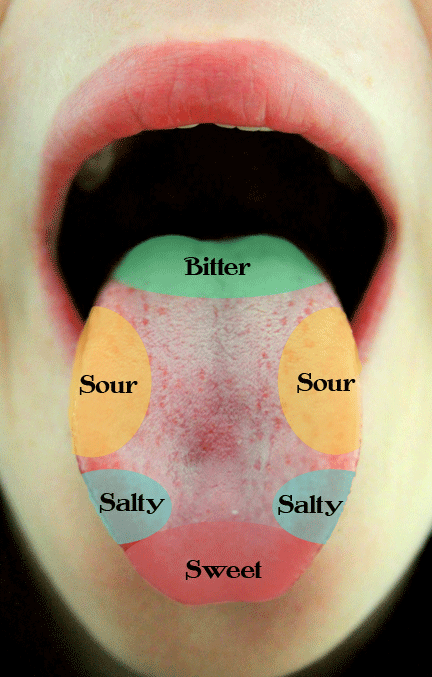
Tongue photo courtesy of Wikipedia
But I swear, y’all, I could taste that ladle full of sour cream ALL OVER my tongue. And there’s a reason for that: the tongue zones are a myth that I was taught as a fact in science class. But I digress.
Today, we’re going to just focus in on the bitter taste receptors. Those little guys that they *thought* just lived way in the back.
If you’re like me, you’ve probably spent your whole life trying to avoid stimulating those bad boys. Bitter stuff (and sour cream in large amounts) is just nasty. Right? Am I right?
I thought avoiding bitter flavors was a great personal priority, but it turns out, I am probably wrong on this one.
The other thing I’m wrong on is that the taste buds are only on the tongue thing. Now, this is where things get weird.
Bitter Taste Receptors WHERE?
Scientists have been quite surprised to discover these little taste receptors in unexpected places in the body.
“The other recent revelation in taste research is that the receptors …are not restricted to the tongue. They are distributed throughout the stomach, intestine and pancreas, where they aid the digestive process by influencing appetite and regulating insulin production. They have also been found in the airways, where they have an impact on respiration, and even on sperm, where they affect maturation.”1.
The bitter taste receptors (T2 receptors) are located in the following areas of the body
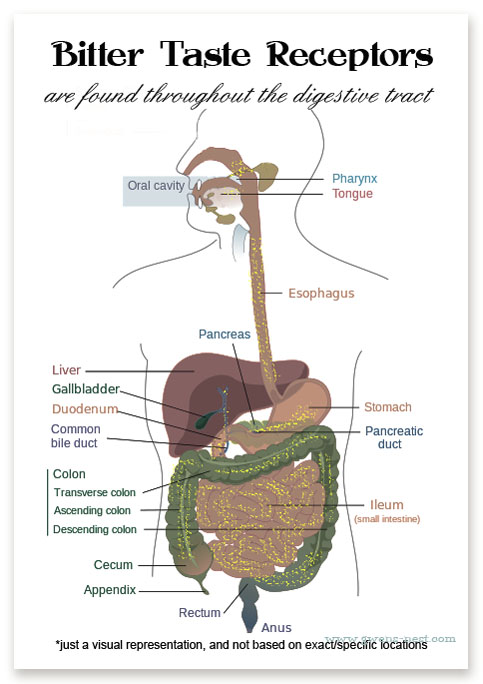
T2 bitter taste receptors are found in the esophagus, stomach, pancreas, bile duct, and small and large intestines.
Isn’t that bizarre? These little guys are found in almost every organ of digestion.
A Big Job Description for Bitter Taste Receptors
But what are they DOING there? Thankfully, my experience with the sour cream ended when I swallowed…the thought of tasting something all the way through the digestive tract is less than appealing.
“Despite the similarities in receptor molecules and transduction cascades, the emerging picture is that the diverse chemoreceptive systems do not all evoke a sensation of taste, but rather serve different functions according to their location.” 2.
What that means in English is, “We’re not real sure what they do yet, but they do cool stuff besides tasting.” It appears, from a variety of research angles, that the taste receptors are actually a communication system for the digestive organs. Historically, bitters were used to enhance digestion and strengthen filtering organs. Modern science seems to be backing this up as well:
“Dr. Osborne’s lab had previously proposed that T2Rs trigger a hormone that stimulates the digestion of fat and protein and limits the absorption of dietary toxins. But exactly how was unclear.
The new experiments suggest that the hormone in turn stimulates neighboring enterocytes—the intestinal cells that absorb nutrients—to produce more of a protein called ABCB1, which transports a variety of chemicals—and toxins—out of cells.” 3
When you taste something bitter on your tongue, your bitter taste receptors are triggered. In turn, they begin to trigger or ‘ping’ all of the other bitter taste receptors all the way down your digestive tract, stimulating your organs of digestion. The espophagus undulates, the pancreas produces enzymes and your own blend of probiotics, the gall bladder dispenses bile to break down fats, and the intestines get primed and ready to digest the food that’s about to come down the hatch.
And check out the cool photo at the bottom of this short article illustrating how bitters enhance the cells ability to remove toxins! (Told you this was really cool stuff!!!)
Awesome news, right? Not really for people who avoid the ‘bitter’ taste. And the taste seems to be key…covering the bitter taste with sweet seems to weaken the overall signals and benefits of digestive bitters.
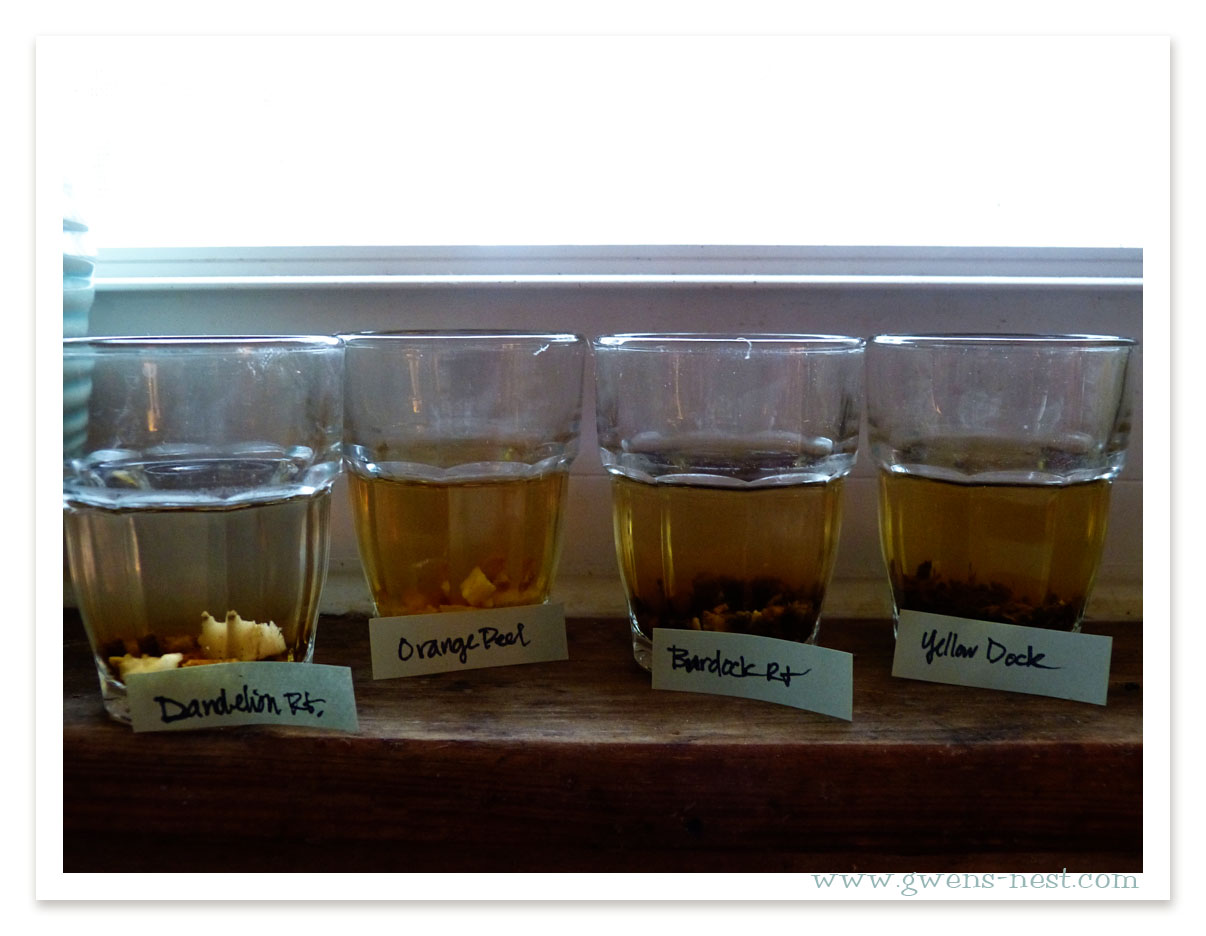
According to herbalist Guido Masé, the people and cultures that eat bitter foods regularly, the bitter taste receptors are hearty, vigorous, and plentiful. For people (like me) and cultures (ours) that avoid bitter tastes, the receptors are far fewer, and they are less sensitive. Weak, puny, paltry bitter taste receptors.
But Guido says that there’s hope: the more you stimulate the bitter taste receptors, the more they reproduce, and the heartier they become. This means that if you begin to include bitter tastes in your meals, you can actually improve your entire digestive tract function! Enhancing your own body’s production of probiotics is far less expensive and more effective than continuing to pop pricey pills, huh?
As with any natural remedy, I want to know if it really works in real life. Turns out, it does…
[bctt tweet=”the more you stimulate the bitter taste receptors, the more they reproduce, and the heartier they become. https://gwens-nest.com/?p=1531″]
Testimonials: Digestive Bitters Work!
For my own part, my younger two children both had some odd issues with <ahem> “number 2”. One child was very constipated, and the other very loose…and this was with plenty of fluids and nearly identical diets. Something was funky in their systems.
This was to the point that the older had functional constipation and refused to go #2 during the day…so at almost age 5, she was still not fully potty trained, and I was waking up to nasty diapers every morning. EVERY morning. And these were abnormally awful, stanky and large stools. Sorry. It was wicked nasty. Something was very wrong, and I didn’t want to give her habit forming meds at such a young age. I wanted it FIXED.
I started offering bitters before meals, and saw a pretty rapid change with both kids. Within weeks, both had properly formed stools, and they became more regular. Both kids are potty trained now and are regular. And they remind me about their bitters if I forget. 🙂
<photos not provided…you’re welcome.>
Here are a few other personal testimonies and experiences with digestive bitters among my online friends:
“I had eczema issues for 30+ years <gulp>, and had tried every diet and cream angle religiously. I was GF for 5+ years/sugar free at times, and had a very healthy/whole foods diet.I still battled painful bouts of eczema on my hands each year as winter set in.
I had heard about bitters being a possible remedy for eczema. I started taking Urban Moonshine’s digestive bitters before meals, and within a month (during the holiday season, even) my eczema cleared. I continued with the bitters, and found that I was not getting any more break outs. Even after indulging in gluten and sugar containing foods over the holidays…a FOR SURE trigger, my eczema did not return.” ~Jen B.
(And Jen is no longer GF!)“They have helped me a great deal in relieving gallbladder pain, the area of my liver and gallbladder used to feel swollen to me. But it is normal these days. I haven’t had a gallbladder attack in a very long time. Also, no more heartburn!” ~Jennifer J.
“Bitters stopped debilitating stomach pain completely. I had tentatively linked the pain to my gallbladder. I took them regularly for several months but rarely do now. Yesterday afternoon, I felt a hard knot in my stomach that felt horrible, possibly due to undigested food sitting there causing gas. It was fast becoming painful enough to limit my movement and stop my plans for the day. I took some bitters and within 5 minutes, the pain was completely gone. Bitters are amazing!” ~Jessica I.
Digestive Bitters Series and Pin
So, are you EXCITED to try these, yet? Check out part 2 in this series, that will include videos/podcasts for learning more, and links to some great digestive bitters blends. And part 3 I share my DIY digestive bitters recipes!
Resources:
1. Neuroscience: Hardwired for taste Bijal P. Trivedi
2. Taste isn’t just for taste buds anymore, Thomas E. Finger and Sue C. Kinnamon (01 Sep 2011)
3.Taste receptors…in the gut? by Bruce Lieberman (01 Aug 2011)
Follow me on Pinterest and never miss a natural remedy!
Follow Gwen’s Nest’s board Gwen’s Nest Herbs & Natural Health on Pinterest.
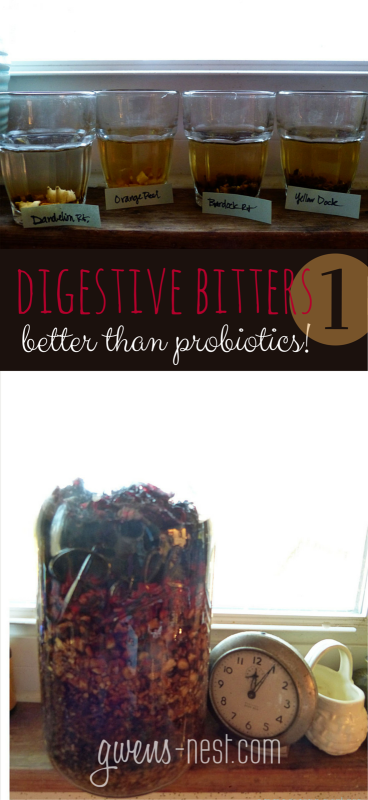
I have no clue what bitters are. I have eaten bitter foods but how do you take “bitters”? I will be watching for more info. Like how do you get your kids to take these?? I too have a problem with #2 and have tried almost everything. Now I take MOM every day or every other day to get things moving. I have read the magnesium is good for me but not sure if it is too much. Waiting…
Hi Pat,
Milk of magnesium is not an absorbent type of magnesium, but it’s very good at moving the bowels. It won’t address magnesium deficiency or really benefit overall magnesium levels.
I’m working on another post for you about bitter herbs, resources, and more. If you want to be sure to get the posts, then you can sign up for the e-mail notification on the upper right side of the page.
Sorry to leave a cliffhanger here,but if I wrote it all out in one post, it would be WAY too long. And it takes me several hours to put together a shorter post like this one.
Thank You looking forward to more info…
Oh, and I’ll definitely address your questions in my next posts on this topic! 🙂
I found the article very interesting especially since I’ve read in several places that the tongue map turned out to be false!!! What do you think? http://www.livescience.com/7113-tongue-map-tasteless-myth-debunked.html
Hi Alicia! I wouldn’t be at all surprised if the tongue map is not accurate. 🙂 I KNEW I could taste that sour cream all over my tongue!
The taste receptors are a relatively ‘new’ discovery, and more is ‘unknown’ about them (from a western scientific mindset) than is known.
I do love to see the science (the image of the toxin dump from bitters fascinates me!), but I also love to look backwards at the use and function of herbs to learn more about the possibilities for how these bitter taste receptors function and the healing potential there.
Just added more to my order! Thanks and can’t wait to read the rest of the series.
I am going to enjoy this! Forwarding to a few friends.
Beautifully spelled out! 🙂 linking to this on my old post if that is ok with you???
I’ll be looking for your next post about what bitters are. Both of my sons had problems with eczema as infants and still have an occasional outbreak every now and then, so I’m really interested in this info. Also for digestive purposes.
Looking forward to reading more on this subject as I suffer from digestive issues. Back home in South America we ate bitter vegetables and I remember my parents drinking a bitter tonic derived from certain wood chips. It was used as a “healing” tonic for many things!
VERY interested in the protocol you used with your kids! My daughter is 3.5y/o and has never had a “formed” #2 🙁 We have tried so many things that helped little or temporarily and am very intrigued about the daily bitters regimen 🙂
Wow!! Strange you write an interesting article on a simple topic Bitter
which I don’t think anyone can imagine. Even I don’t have any idea that bitters
meal would be digestive symptoms. Even I don’t know much about bitters but I enjoyed your article so much. Its first time am here but now I am keen to read more
article of your.
I just found Your site the other day looking for Swedish bitter recipes ! this is so great all the background info beforehand . I am so not a bitter herb person & I can’t stand fermented stuff .I eat flowers & love juices ! but really felt called to investigate bitters .feel whenever I get that calling to look into a plant there is always a reason behind it . I am so glad to have found your site .Thank You ♥
Very informative article and an interesting subject I had never thought of before. What I don’t understand is if the bitter flavor is what causes the reaction to help digestion, why do you need to take a bitters tincture to achieve this? Why can’t you just eat something bitter, like a bitter salad, or bitter tea or coffee? I have always sweetened my tea and coffee as I don’t like bitter flavors at all. I do like the idea of only having to swallow a small amount of a tincture rather than eat a whole bitter salad or drink a cup of something bitter. But would they both accomplish the same thing? I am dealing with horrible eczema, mostly on my hands, and would try just about anything to get this to go away. And becoming immune to poisonous berries would be good too… j/k lol.
Eating something bitter does help in the same way so long as you taste the bitter. The purpose of making a tincture is just like you are saying…it’s a convenience and ‘get it over with’ factor, so you’re not having to make a bitter component to each meal. Just think of additional bitter foods or drinks you choose to use as bonuses. 🙂
I have a friend who had incredible results with eczema by treating to help her digestion (avoiding allergens initially). When she started bitters, she saw a big shift and was able to go back to a normal diet after several years of allergen free eating. They can be a powerful part of an eczema/gut recovery program!
This is very useful information.
Hello,
Just started taking bitters and i cannot beleive the difference it has made with my digestion in only two days. Amazing. So do you feel that taking probiotics supplements is not needed if you use bitters.
Thanks for your article and your time.
Awesome, Anne!
IMO, probiotics can be an important part of fixing a bad mix of gut flora, but bitters will help maintain the digestive vigor long term. So I might use both starting out and then taper off of the probiotics and enzymes when your digestion gets stronger.
Thanks very much, that sounds like the right thing to do, makes sense, so I will do that. Have a great day.
The tongue map is not a real thing. Receptors are spread out all over the tongue. There are no zones.
Yes! Another commenter pointed that out, and I looked it up. You’re right! It was a myth that was taught to me as science when I was a kid. 🙂
I am just seeing this for the first time, can you tell me where I can purchase this and how to start taking the digestive bitters. Thanks
Hi Kim! I wrote a post with some of my favorite brands of digestive bitters here. And if you’re of the DIY persuasion, I have bitters recipes here. (hint: it’s as easy as making tea…with rum. Ha!)
Gwen,
I purchased the bitters after your post. I love your blog. Can you tell me if a numbness in the tongue is normal when first starting on the bitters? Thanks so much!
Hmmm…the alcohol in the bitters may give that sensation a little, but with numbness I often think of an allergic reaction. I’d keep that in mind and see if you’re not responding well to one of the herbs?
your article’s great. i knew they were gd but not like you described. i’m excited to be taking them asap.
An interesting read! Love Gods herbs. Have you tried any cultured foods? After a life time of antibiotics my digestive health was ruined. I took expensive probiotic capsuls for years and it wasn’t until I started consuming cultured foods that I saw much help. Kombucha and fermented veggies such as pickles and sour kraut. It turned things around in a few days and since its food it doesn’t cost me any extra like the processed probiotic in the capsuls! Working on adding kefir and having all three each day, one with each meal. I can now digest things I couldn’t before.
Awesome insights, CeAnne! I have made sauerkraut and tried my hand at kombucha and even fermented pickles, but haven’t been super successful at the last two. 🙂 I really need to get my kombucha ferment going again!
Hey Gwen,
I started THM and loving it but knew my digestive needed some help. I’ve read that you shouldn’t use digestive bitters or digestive enzymes long term. Is this true? Obviously this article is focused on the bitters so I’m curious if you read the same. Apparently your to stop and give the body a break. Just curious your thoughts…
I think there are times where some people do need supplemental enzymes and probiotics, and some people would need them long term, but that’s rare.
I prefer to see supplementation as a means of supporting healing. So the goal would be to come off of supplements, and to heal the body so that you don’t need them. Bitters are a great way to support stronger digestion instead of replacing what the body should be making itself.
please can you tell me what is good for hital hernia and gerd diet acid reflux i need urgent help
Your article suggests that the pancreas creates it’s own probiotics:
“The espophagus undulates, the pancreas produces enzymes and your own blend of probiotics” …
Is that what you actually mean, and do you have a source for that information?
Yep! That’s what I mean. 🙂 I don’t have a resource off the top of my head, but any med school physiology book that describes the function of the pancreas will work. I’ve found them online.
Thank you for a good explanation :).
Do bitters still help if you mix in honey to help little kids take them?